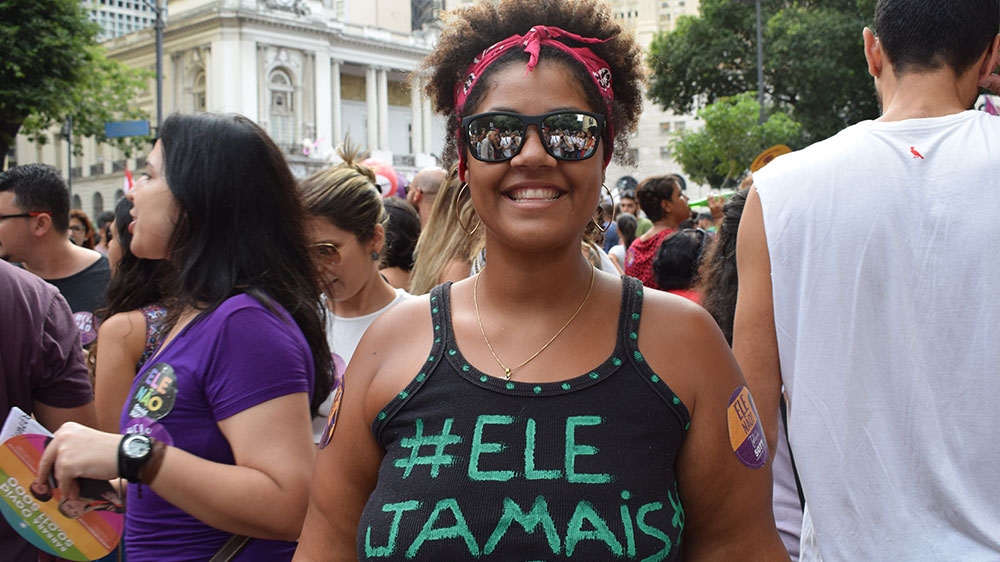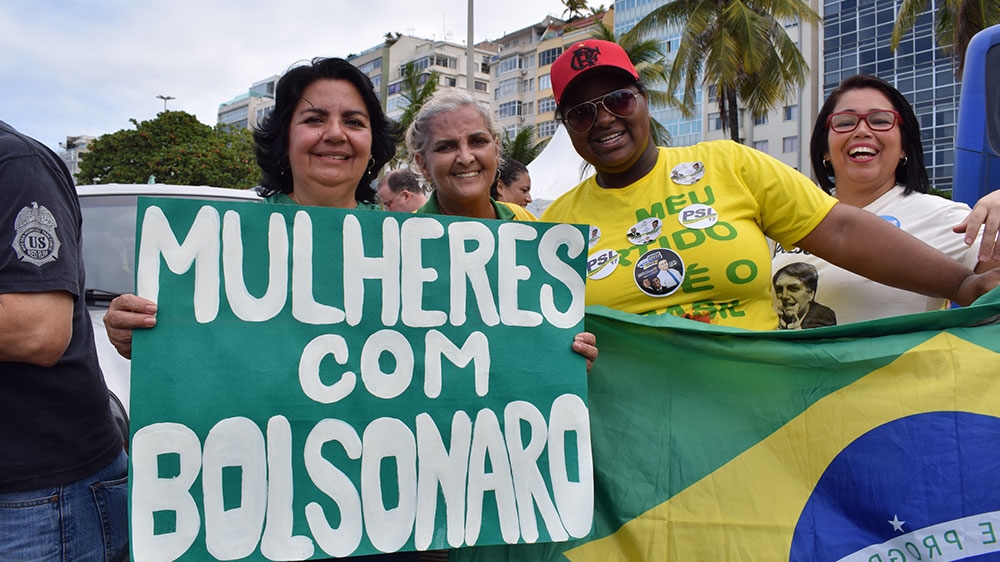Brazil: Thousands of women rally against far-right Bolsonaro
Rio de Janeiro, Brazil – Thousands of people took to the streets and marched in cities across Brazil on Saturday as part of a women-led protest against far-right, frontrunner presidential candidate Jair Bolsonaro.
The demonstrations, a manifestation of the #EleNao (#NotHim) movement that has gathered steam on social media in recent weeks, began early afternoon in at least 62 cities nationwide including metropolis Sao Paulo and the capital, Brasilia.
In Rio de Janeiro, Bolsonaro’s political base, men and women gathered in the city’s Centro neighbourhood to show their objections to the former army captain’s controversial campaign.
Chanting “not him”, protesters of all ages marched, holding anti-Bolsonaro signs.
“I’m here to fight against homophobia, in favour of black people, for democracy and against the oppressor,” Priscila Almeida, told Al Jazeera.
“Not him [Bolsonaro], never him … anyone but Bolsonaro,” Almeida, 25, added.
 |
| Priscila Almeida, pictured, said she would ‘never’ back Bolsonaro [David Child/Al Jazeera] |
Bolsonaro, a Rio de Janeiro congressman since 1991, has made several overtly misogynistic comments in the past, as well as controversial statements on issues relating to race, sexuality and Brazil’s military government, which was in power between 1964 and 1985.
In 2014, the 63-year-old told fellow congresswomen Maria do Rosario: “I would never rape you because you do not deserve it”. He was repeating a claim he made in 2003.
In December 2015, Bolsonaro was convicted by a lower court of committing moral damage and fined about $2,500. A higher court upheld the conviction in August 2017 after he appealed the ruling. He has since appealed again and the case is now with Brazil’s Supreme Court.
Last year, he said having a daughter was a “weakness”.
“Bolsonaro is worrying because he is not alone … many people think like him and are influenced by his speeches,” Luzia Costa, 68, told Al Jazeera.
“[And] He is a man who hates everything, men, women, gay and black people,” Costa added.
‘A shadow period’
Despite making up 52 percent of Brazil’s electorate, women hold just 13 of 81 seats in the country’s upper house senate. Fewer than 11 percent of the 513 seats in the lower house Chamber of Deputies are held by women.
Brazil ranks 156th in the world for female representation in parliament, placing it in the lowest 20 percent globally, according to the latest data compiled by global organisation for national legislatures the Inter-Parliamentary Union.
 |
| Tens of thousands of anti-Bolsonaro demonstrators gathered in central Rio [David Child/Al Jazeera] |
Clarisse Gurgel, a professor of human sciences at the Federal University of the State of Rio, said the #NotHim movement marked an important moment of resistance by Brazilian women, but that it would not alone “be enough for a qualitative upgrade to politics”.
“Bolsonaro is the expression of masculinity, and cannot handle the feminine, which is the most beautiful aspect of women,” Gurgel told Al Jazeera.
“Women, in contrast to men, aren’t born with the illusion that we have a gun between our legs … we now walk into a shadow period, [but] what we can’t do is let the fear take us,” she added.
Bolsonaro’s rejection rate among women is 50 percent, according to the latest polling by the Brazilian Institute of Public Opinion and Statistics (IBOPE), and 33 percent among men.
‘I’m a patriot’
Hours before the demonstration in Centro got under way, hundreds of Bolsonaro supporters gathered along Rio’s Copacabana beachfront in support of his candidacy.
Bolsonaro was stabbed earlier this month in an apparent assasination attempt, leaving him hospitalised and unable to campaign.
Occupying a small section of the palm-tree lined sidewalk, supporters clad in the classic green and yellow of the Brazilian flag chanted “Him Yes” and decried the political left, in particular the Workers’ Party (PT), as thieves and liars.
Thais Pena, 30, said she would back Bolsonaro in the election because she was “a patriot” and it would be a “way of demonstrating dissatisfaction with the current state of government”.
“I believe we are in a stage of crisis, the economy is broken, education is abandoned, we don’t have security and we don’t have the basic services that should come as a return from taxes,” Pena said.
“I wholly respect them [the women at the #EleNao march], every woman has the right of expressing what they think is better [for them] and I believe the majority of them are feeling threatened or afraid of what is to come if Bolsonaro wins, but I don’t think they need to be … the media distorts what he says,” she added.
 |
| Thais Pena, pictured, a self-described Bolsonaro supporter and ‘patriot’ [David Child/Al Jazeera] |
Several other supporters cited security as their key concern, saying they would vote for Bolsonaro because he has pledged to crack down on crime and ramp up public security.
“The lack of security is the main problem [in Brazil] … some things have to change, badly,” Daniel Campos, 40, said.
Violence in Brazil, home to seven of the world’s 20 most violent cities, is one of voters top concerns this election, alongside the country’s stuttering economy.
Last year, homicides rose to a record high figure of 63,880, up 2.9 percent from 2016, according to the Brazilian Forum of Public Security.
Beyond his proposals for security issues, a number of other Bolsonaro supporters said he presented an alternative to the country’s embattled political class, whose reputation has been ravaged by a string of high-level corruption scandals in recent years.
 |
| Hundreds of Bolsonaro supporters demonstrated on Rio’s Copacabana beachfront [David Child/Al Jazeera] |
“A Bolsonaro presidency would change Brazil for the better,” Elias Figueira, 57, said.
“I’ve had enough … I’m tired of 25 years of lies from the left, they are all two sides of the same coin,” Figueira added, referring to the PT and the Brazilian Social Democracy Party (PSDB), which was in power between 1994 and 2002 before the PT won the presidency under Lula.
Bolsonaro leads the polls
Saturday’s rallies took place fewer than two weeks Brazilians are scheduled to vote on the country’s next president, on October 7, as part of national and state-level elections.
More than 1,600 positions are up for grabs, including the presidency and the majority of seats in Brazil’s bicameral congress, with about 147 million voters expected to participate.
Bolsonaro has consistently topped opinion polls in the run-up to the vote, ahead of the PT’s candidate Fernando Haddad.
 |
According the latest figures, released by polling institute DataFolha on Friday, 28 percent of voters intend to support Bolsonaro.
Some 22 percent, meanwhile, intend to vote for Haddad, the PT’s replacement candidate for former Brazilian president Luiz Inacio ‘Lula’ da Silva .
Lula, the country’s most popular politician, was barred from running because of a corruption conviction and is currently serving a 12-year term in jail.




